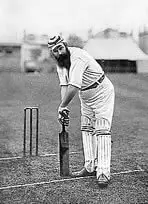By an individual’s own efforts.
Off his own bat
What's the meaning of the phrase 'Off his own bat'?
What's the origin of the phrase 'Off his own bat'?
One question that often gets asked on this website about the figurative expression ‘off his own bat’ is “should that be ‘off his own back'”? Well no, it shouldn’t. ‘Off your own back’ originated as a mishearing of the former expression. It has gained sufficient currency to be considered as a viable everyday alternative of the correct version, but purists dismiss it as a straightforward error.
Bats come in many forms of course and, as is always the case with such words when they occur in phrases where the context clear, the meaning is open to fanciful interpretations. So, as with the yards in ‘the whole nine yards‘, which are guessed to be any number of things, the ‘bat’ in ‘off his own bat’ has been said to be one of these: the flying mammal, a butter pat, a tool used in brickmaking etc, etc. In fact, the bat in question is a cricket bat and the first activity that was said to be done ‘off someone’s own bat’ was to score runs.
The first citation of ‘off his own bat’ in print comes from the pen of the celebrated cricket historian and statistician Henry Thomas Waghorn, in Cricket Scores, 1742:
“The bets on the Slendon man’s head that he got 40 notches off his own bat were lost.”
The ‘Slendon man’ was probably Richard Newland, the star of the Slindon Cricket Club and cricket’s first great all-rounder.
It is worth noting that the phrase is found in print several times during the next century and all of the known citations are explicit cricket references – the other supposed derivations of ‘bat’ in this context owe everything to imagination and nothing to evidence. There’s an example in Our Village: Sketches of Rural Character and Scenery, by Mary Russell Mitford, 1824:
“William Grey got forty notches off his own bat; and that brilliant hitter Tom Coper gained eight from two successive balls.”
Why runs that were scored ‘off someone’s own bat’ were worth mentioning derives from the arcane rules of cricket. Runs, which were often referred to as ‘notches’ in early references to the game, may be scored in cricket in several different ways. These include various forms of ‘extra’ runs, for example, bowling misdemeanours like wides or no balls; various forms of ‘bye’, in which the batsmen run without first hitting the ball; and overthrows, where a fielder throws the ball at the wicket and misses, giving time for the batsmen to run again. All of these are counted towards the batting side’s score, but it is the runs that a batsman scores ‘off his own bat’ that gain kudos for the player.
The first usage of ‘off his own bat’ as a figurative, that is, non-cricket, phrase is in Fragment on Irish Affairs by the Rev. Sydney Smith, May 1845:
“Dr. Hodgson is a very worthy, amiable man… but [I] suppose he had no revenues but what he got off his own bat.”
See also: the meaning and origin of bats in the belfry
The history of “Off his own bat” in printed materials
Trend of off his own bat in printed material over time
Related phrases and meanings
Browse more Phrases
About the Author

Phrases & Meanings
A-Z
A B C D E F G H I J K L M N O P Q R S T UV W XYZ
Categories
American Animals Australian Bible Body Colour Conflict Death Devil Dogs Emotions Euphemism Family Fashion Food French Horses ‘Jack’ Luck Money Military Music Names Nature Nautical Numbers Politics Religion Shakespeare Stupidity Entertainment Weather Women Work
How did we do?
Have you spotted something that needs updated on this page? We review all feedback we receive to ensure that we provide the most accurate and up to date information on phrases.
